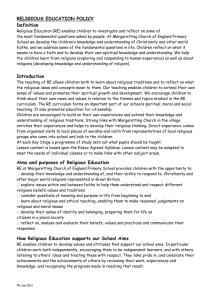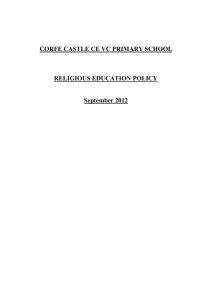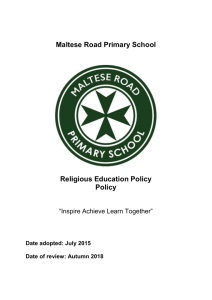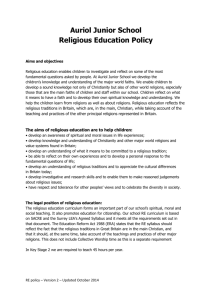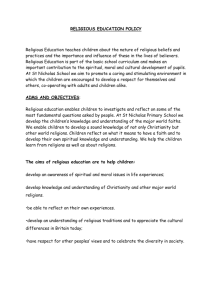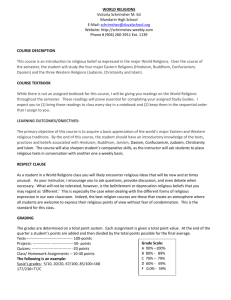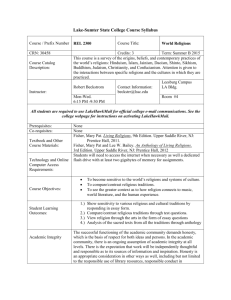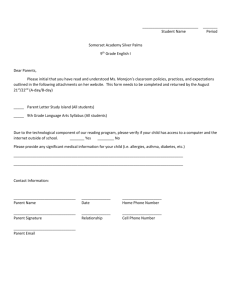RE-Policy - Berkley First School
advertisement
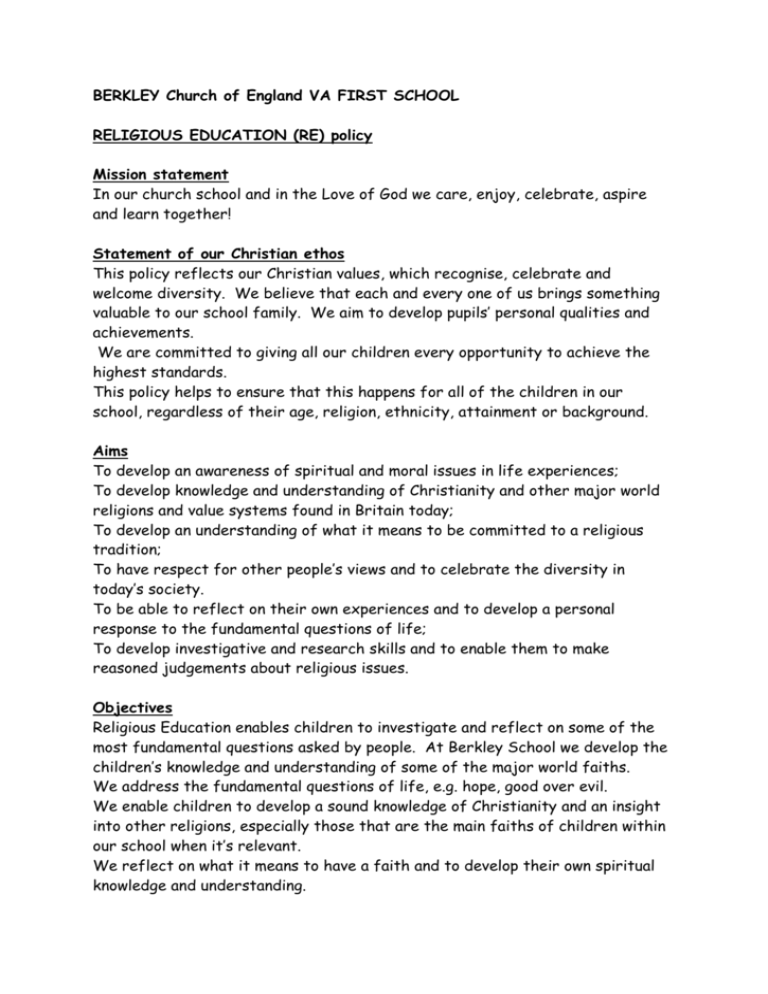
BERKLEY Church of England VA FIRST SCHOOL RELIGIOUS EDUCATION (RE) policy Mission statement In our church school and in the Love of God we care, enjoy, celebrate, aspire and learn together! Statement of our Christian ethos This policy reflects our Christian values, which recognise, celebrate and welcome diversity. We believe that each and every one of us brings something valuable to our school family. We aim to develop pupils’ personal qualities and achievements. We are committed to giving all our children every opportunity to achieve the highest standards. This policy helps to ensure that this happens for all of the children in our school, regardless of their age, religion, ethnicity, attainment or background. Aims To develop an awareness of spiritual and moral issues in life experiences; To develop knowledge and understanding of Christianity and other major world religions and value systems found in Britain today; To develop an understanding of what it means to be committed to a religious tradition; To have respect for other people’s views and to celebrate the diversity in today’s society. To be able to reflect on their own experiences and to develop a personal response to the fundamental questions of life; To develop investigative and research skills and to enable them to make reasoned judgements about religious issues. Objectives Religious Education enables children to investigate and reflect on some of the most fundamental questions asked by people. At Berkley School we develop the children’s knowledge and understanding of some of the major world faiths. We address the fundamental questions of life, e.g. hope, good over evil. We enable children to develop a sound knowledge of Christianity and an insight into other religions, especially those that are the main faiths of children within our school when it’s relevant. We reflect on what it means to have a faith and to develop their own spiritual knowledge and understanding. We help children learn from religions AT 2 as well as about AT1 religions. The legal position of religious education Our school curriculum for religious education meets the requirements of the 1988 Education Reform Act (ERA). The ERA stipulates that Religious Education is compulsory for all children, including those in the reception class who are less than five years old. The ERA allows parents to withdraw their child from religious education classes if they so wish, although this should only be done once the parents have given written notice to the school governors. The ERA also allows teachers to refuse to teach religious education, but only after they have given written notice of their intention to the school governors. The Religious Education curriculum forms an important part of our school’s spiritual, moral and social teaching. It also promotes education for citizenship. Our school RE curriculum is based on the Somerset’s LA’s Agreed Syllabus Awareness, Mystery and Value and it meets all the requirements set out in that document. The ERA states that the RE syllabus should reflect the fact that the religious traditions in Great Britain are in the main Christian and that it should, at the same time, take account of the teachings and practices of other major religions. Teaching and Learning Styles The school uses a variety of teaching and learning styles in RE. Our principal aim is to develop the child’s knowledge, skills and understanding in RE which is often through discussion, use of artefacts, visits, books and DVDs. ICT is used to support R.E when appropriate. This is carried out through the weekly lessons that have a proportion of whole class and group teaching. Children use a variety of ways to record their work and are encouraged to ask questions and reflect on the concepts and beliefs under discussion. Religious Education Curriculum Planning We operate a planning procedure agreed by the whole teaching staff, based upon The Somerset Agreed Syllabus for RE ,Awareness, Mystery and Value. Where appropriate we will plan RE into our creative curriculum. We develop schemes of work and lesson plans which give details of areas of enquiry, activities for teaching and learning, questions and learning outcomes. We use assessment for learning and adapt our planning as a result of the assessment. Differentiation We aim to encourage all children to reach their full potential through the provision of varied opportunities. We recognise that our curriculum planning must allow pupils to gain a progressively deeper understanding and competency as they move through the school. Careful thought will be given to the provision of appropriately structured work for children with SEN. The school used the strategies of “The Dyslexia Friendly School” that enable all children increased access to the curriculum through a broad –based, multi-sensory, visual, auditory and kinaesthetically planned curriculum. The most able children within our school, including those children who are Gifted and Talented, are identified so that their individual needs are acknowledged. Planning attempts to ensure that the level of challenge is appropriate to their specific needs. The Foundation Stage We encourage the development of respect and understanding of different beliefs and religions as well as for their own culture and beliefs. Assessment and Reporting Opportunities for assessment will be identified in planning. Performance will be regularly assessed and monitored in accordance with the Agreed Syllabus. Marking is carried out in accordance with an agreed school policy. The teacher will pass on relevant information to other teachers. Foundation Stage Profiles, Key Stage 1 and 2 Teacher Assessments. Staff, hold meetings with parents and written annual reports are forwarded to parents in the summer term. The Role of the Religious Education Co-ordinator Monitor the standards of children’s work and the quality of teaching across the school Provide guidance and support to colleagues in the implementation of the Somerset Agreed Syllabus and schemes of work leading to improved quality and continuity of the teaching of RE. Encourage and assist in in-service training Being informed about current developments in the subject Provide a strategic lead and direction for the subject in the school Advise the Headteacher of any action required (eg resources, standards etc) Encourage ways of involving parents in their children’s learning Promote liaison throughout the school / cross phase / transfer Write annual report to the governing Body outlining developments, significant achievements, future plans etc within RE in the school Work with the Headteacher on the School Development Plan with respect to RE. Purchase, organise and maintain teaching resources Manage a delegated budget and keep spending within it Personal, Social, Health Education (PSHE) and Citizenship Spiritual, Moral and Cultural Development RE contributes to the teaching of elements of PSHE and Citizenship. The children have the opportunity to discuss how they feel about their own work and the methods and approaches used by others. The teaching of RE offers opportunities to support the social development of our children through the way we expect them to work with each other in lessons. Groupings allow children to work together and give them the chance to discuss their feelings about their own work and the work of others. Their work in general helps them to develop a respect for the abilities of other children and encourages them to collaborate and co-operate across a range of activities and experiences. The children learn to respect and work with each other and with adults, thus developing a better understanding of themselves. Safety We recognise that all teachers must plan safe activities for RE and actively raise children’s awareness of hazards and risks when working with materials and equipment and take action to control those risks. E-Safety E-safety is a priority in all our planning and teaching. Learning opportunities are planned to reinforce this message. Resources The church building, grounds and clergy and other visitors .are a great resource. We subscribe to the Resource Centre at the Old Deanery in Wells. This provides book and DVDs each term for each of the units of work. We also have a wide range of resources in the school library, which include books, DVDs and artefacts. ICT is used to support R.E when appropriate. Equal opportunities and community cohesion The teaching of RE will be in accordance with the present policy for Equal opportunities. We aim to provide equal access to RE for those children with Special Educational Needs and those pupils who are very able and require extension activities, through small group work, through the support of teaching assistants where available and through carefully differentiated activities. Through the teaching of RE we aim to work towards a society in which there is a common vision and sense of belonging by all communities; a society in which the diversity of people’s backgrounds and circumstances is appreciated and valued; a society in which similar life opportunities are available to all and a society in which strong and positive relationships exist and continue to be developed in school and in the wider community. RE Co-ordinator: Yvonne Rayner Review date: Spring 2016
